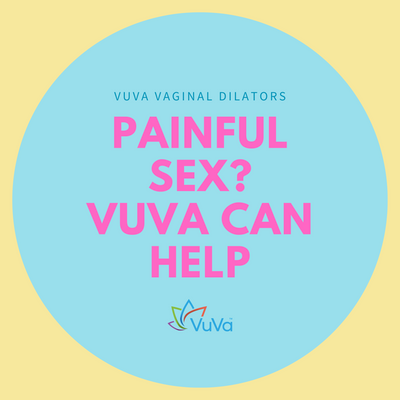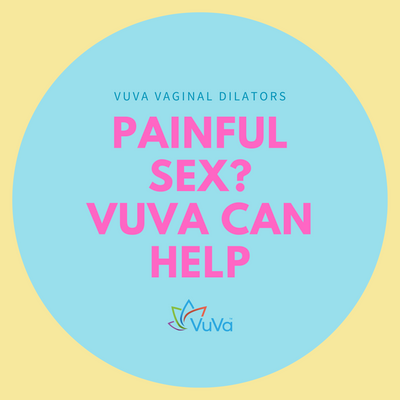
| Tara Langdale
Why Does It Hurt When He Touches Me Down There? by VuVa Dilator Company
Experiencing pain during intimate contact is a sensitive and often distressing issue that many women face. It's crucial to understand that this problem is not uncommon, and there are various reasons why it may occur. Addressing the discomfort openly and seeking appropriate help can lead to effective solutions. This blog post aims to shed light on the reasons for pain during intimate contact, the importance of professional consultation, and how to manage and prevent such pain.
Understanding Female Anatomy
To comprehend why pain might occur during intimate contact, it's essential first to have a basic understanding of the female reproductive system. The female anatomy includes several areas that can cause discomfort if something is amiss:
- Vulva: The external part of the female genitalia.
- Vagina: The internal canal leading from the vulva to the cervix.
- Cervix: The lower part of the uterus opening into the vagina.
- Urethra: The tube through which urine exits the body, located near the vaginal opening.
Discomfort can stem from any of these areas, and identifying the exact source is crucial for proper diagnosis and treatment.
Common Causes of Pain
Infections
Infections are a prevalent cause of pain in the genital area. These can include:
- Yeast Infections: Caused by an overgrowth of Candida fungi, leading to itching, burning, and discomfort.
- Bacterial Vaginosis: An imbalance in the natural bacteria of the vagina, causing irritation and a fishy odor.
- Sexually Transmitted Infections (STIs): Conditions like herpes, chlamydia, and gonorrhea can cause significant pain and discomfort.
Medical Conditions
Several medical conditions can lead to pain during intimate contact:
- Vulvodynia: Chronic pain in the vulva without an identifiable cause.
- Vaginismus: Involuntary muscle spasms in the vaginal muscles, making penetration painful or impossible.
- Vaginal Atrophy: Thinning, drying, and inflammation of the vaginal walls, often due to decreased estrogen levels during menopause.
Emotional or Psychological Triggers
Emotional factors can also play a significant role in causing pain during intimate contact:
- Anxiety and Stress: These can lead to muscle tension, making physical contact uncomfortable.
- Past Trauma: Experiences of sexual abuse or trauma can result in physical pain during intimacy.
- Relationship Issues: Emotional disconnect or unresolved conflicts with a partner can manifest as physical discomfort.
Seeking Professional Help
If you experience pain during intimate contact, it's vital to consult a healthcare provider. Here’s how to prepare for your visit and what to expect:
Preparing for the Visit
- Track Symptoms: Keep a record of your symptoms, including when they occur, their severity, and any potential triggers.
- List Questions: Prepare questions for your doctor about possible causes, treatments, and preventive measures.
- Medical History: Be ready to discuss your medical history, including any past infections, conditions, or medications.
What to Expect During the Examination
- Physical Exam: Your doctor will likely perform a pelvic exam to check for any physical abnormalities.
- Swabs and Tests: Tests for infections or other conditions may be conducted.
- Discussion: Be prepared for an open discussion about your sexual and emotional health.
Treating and Preventing Pain
Depending on the cause, several treatments and preventive measures can help alleviate pain:
Medical Treatments
- Medications: Antibiotics for infections, topical anesthetics for pain relief, or hormone therapy for vaginal atrophy.
- Dilator Physical Therapy: Pelvic floor therapy can help with conditions like vaginismus. VuVa Vaginal Dilator Therapy can be done at home if intercourse or insertion is painful.
- Counseling: Therapy can address psychological factors contributing to pain.
Lifestyle Changes
- Proper Hygiene: Maintain good genital hygiene to prevent infections.
- Lubricants: Use lubricants during intimacy to reduce friction and discomfort.
- Healthy Diet: A balanced diet can support overall health and reduce the risk of infections.
The Importance of Open Communication
Open and honest communication is critical in managing and overcoming pain during intimate contact. Discuss your concerns with your partner and healthcare provider to ensure comprehensive care and support. This openness helps in understanding each other’s needs and finding effective solutions together.
Conclusion
Experiencing pain during intimate contact is a challenging issue, but understanding its causes and seeking appropriate help can lead to effective management and relief. Remember the importance of self-care, open communication, and professional consultation. For additional resources and further reading, please explore the links below:
- [American College of Obstetricians and Gynecologists (ACOG)](https://www.acog.org/)
-
Mayo Clinic - Women's Health
-
National Vulvodynia Association
By taking proactive steps, you can improve your sexual health and overall well-being.
-
National Vulvodynia Association













